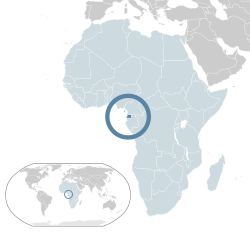Republic of Equatorial Guinea
| |
|---|---|
| Motto: Unidad, Paz, Justicia (Spanish) "Unity, Peace, Justice" | |
| Anthem: Caminemos pisando las sendas de nuestra inmensa felicidad (Spanish) Let Us Walk Treading the Paths of Our Immense Happiness | |
| Capital | Malabo (current) Ciudad de la Paz (under construction) 3°45′N 8°47′E / 3.750°N 8.783°E |
| Largest city | Bata, Malabo |
| Official languages | |
| Recognised regional languages | List |
| Ethnic groups (2020) | |
| Religion (2020) |
|
| Demonym(s) | |
| Government | Unitary dominant-party presidential republic under a dictatorship |
| Teodoro Obiang Nguema Mbasogo | |
| Teodoro Nguema Obiang Mangue | |
| Manuel Osa Nsue Nsua | |
| Joaquín Asong Owono Mbang | |
| Legislature | Parliament |
| Senate | |
| Chamber of Deputies | |
| Independence from Spain | |
Declared | 12 October 1968 |
| Area | |
Total | 28,050 km2 (10,830 sq mi) (141st) |
Water (%) | negligible |
| Population | |
2024 estimate | 1,795,834 (154th) |
| GDP (PPP) | 2025 estimate |
Total | |
Per capita | |
| GDP (nominal) | 2025 estimate |
Total | |
Per capita | |
| HDI (2022) | medium (133rd) |
| Currency | Central African CFA franc (XAF) |
| Time zone | UTC+1 (WAT) |
| Date format | dd/mm/yyyy |
| Calling code | +240 |
| ISO 3166 code | GQ |
| Internet TLD | .gq |
| |
Table of Contents
Introduction to Legal Reforms in Equatorial Guinea
The recent legal reforms in Equatorial Guinea emerge against a backdrop of political, social, and economic challenges that have characterized the nation for decades. Historically, Equatorial Guinea has experienced a complex interplay of authoritarian governance and economic dependency on oil revenues. However, this singular focus on oil has not translated into widespread prosperity, leaving significant segments of the population in poverty. The need for comprehensive reforms is now more pressing than ever to foster development and strengthen the rule of law in the country.
The political environment in Equatorial Guinea has long been marked by a lack of transparency and limited political pluralism. These factors have contributed to widespread public discontent and calls for change. As citizens become increasingly aware of their rights and demand accountability from their leaders, the government recognizes the necessity to adapt its legal framework. This shift is aimed not only at addressing the immediate grievances of the populace but also at attracting foreign investment and improving the country’s international standing.
Socially, Equatorial Guinea grapples with issues related to human rights, gender equality, and the protection of vulnerable communities. Recent protests and civil society movements have underscored the urgent need for legal frameworks that protect individual rights and bolster civic participation. These social dynamics compel the government to implement reforms that align with international human rights standards and demonstrate a commitment to improving citizens’ quality of life.
Economically, while the oil sector remains dominant, diversification into other sectors such as agriculture and fisheries has become crucial. Legal reforms that promote a more favorable business environment are essential for attracting domestic and foreign investment in these sectors. The intertwining of these political, social, and economic dimensions illustrates the necessity for a comprehensive approach to legal reforms, fostering a more stable and prosperous Equatorial Guinea.
Overview of New Laws and Amendments
Equatorial Guinea has seen a wave of legal reforms aimed at modernizing its legal framework and aligning it more closely with international standards. The government has introduced several new laws and made significant amendments to existing regulations, reflecting the country’s commitment to governance, economic development, and social issues. Among these developments, the revised Penal Code stands out, as it aims to address various crimes more effectively and ensure a fairer justice system. This comprehensive reform has introduced clearer definitions of offenses, enhanced penalties for serious crimes, and emphasized the protection of human rights.
Another pivotal reform is the introduction of the new Investment Law. This piece of legislation seeks to encourage foreign investment by providing a transparent framework that outlines the rights and obligations of both local and international investors. The law includes guarantees against arbitrary expropriation and aims to foster a more stable business environment. Furthermore, it outlines processes for resolving disputes efficiently and equitably.
The reforms are not limited to economic laws; they extend to social legislation as well. Recent amendments to labor laws are aimed at protecting workers’ rights and improving working conditions. This includes provisions on minimum wage, working hours, and occupational safety standards, highlighting the government’s recognition of the importance of social equity in economic growth.
Moreover, changes in environmental regulations reflect a growing awareness of sustainable development. The newly enacted Environmental Protection Law introduces stricter guidelines for environmental assessments and promotes responsible practices among industries. Through these reforms, the government aims to strike a balance between economic progression and ecological preservation.
In summary, the recent legal reforms in Equatorial Guinea mark a substantive evolution of the country’s legal landscape, addressing critical issues across various sectors. These developments not only aim to enhance governance but also seek to build a robust framework that supports economic advancement while safeguarding citizens’ rights.
Motivations Behind the Legal Reforms
The legal reforms in Equatorial Guinea have been motivated by a complex interplay of political, economic, and social factors. At the political level, the government seeks to enhance its legitimacy and stabilize its authority in a context marked by international scrutiny. This has been influenced by a confluence of internal challenges and external pressures, notably from international organizations and foreign governments advocating for improvements in governance, human rights, and the rule of law in the region.
Economically, Equatorial Guinea has experienced significant oil wealth, but there has been a growing realization that reliance on oil and gas is not sustainable in the long term. The government has recognized the necessity to diversify its economy and create a more conducive environment for investment. Legal reforms targeting property rights, business regulations, and fiscal policy are part of an effort to attract foreign direct investment, which is crucial for sustainable economic growth. In this vein, the reforms aim to create a more predictable legal framework that can foster business confidence and enhance economic opportunities.
Socially, there exists a rising demand among the populace for enhanced participation in governance and improved social services. The citizens of Equatorial Guinea are increasingly voicing their concerns about issues such as education, health care, and employment. The government has initiated reforms to respond to these public demands, acknowledging that social unrest can pose significant risks to their governance. Reforms directed at improving access to justice, enhancing civil liberties, and promoting transparency are reflective of this shift towards addressing societal needs.
In summary, the motivations behind the legal reforms in Equatorial Guinea are multifaceted. They stem from a mix of political aspirations, economic necessities, and social pressures, all of which are pivotal in shaping the legislative landscape in the country. Understanding these motivations provides insight into the reform process and its potential impacts on the society and governance of Equatorial Guinea.
The Legislative Process: How These Reforms Were Achieved
The legislative process in Equatorial Guinea plays a crucial role in the formulation and implementation of new laws and amendments. Primarily, this process begins when a proposed law, often originating from government agencies or political party agendas, is drafted and submitted to the parliament. The proposal is then reviewed by the National Assembly, the country’s legislative body, where it undergoes a series of discussions, debates, and revisions. This process ensures that various perspectives are considered before a law is enacted.
Throughout this legislative journey, significant involvement from various stakeholders is observed. Political parties are instrumental in shaping the trajectory of proposed reforms. They engage in critical debates within parliamentary sessions, fostering dialogues that often reflect the interests of their constituencies. Furthermore, the ruling party, which typically holds a majority in the National Assembly, significantly influences the timeline and manner in which reforms are debated and passed.
Similarly, civil society organizations possess a pivotal role in the legislative process. They advocate for reforms that address pressing social issues, promote transparency, and uphold human rights. These organizations frequently lobby members of the National Assembly, providing data and insights to support their recommendations. Their active participation ensures that legislation resonates with the needs and concerns of the broader population.
After thorough discussions and adjustments, proposed laws are put to a vote in the National Assembly. A majority approval leads to the law being sent to the President for sanctioning. Once signed, these laws enter into force, marking an important step in the legislative framework of Equatorial Guinea. This structured process highlights the collaborative effort between various levels of government and societal actors in driving legal reforms, underscoring the importance of inclusivity in shaping the nation’s legal landscape.
Expected Impact on the Legal System
The recent legal reforms in Equatorial Guinea are poised to significantly reshape the country’s legal system. These changes aim to create a more transparent, efficient, and equitable framework that aligns with modern legal standards. One of the primary areas of focus is the overhaul of judicial processes. These reforms are anticipated to streamline court operations, reducing bureaucratic delays that have long plagued the justice system. By implementing new technological solutions and enhancing case management practices, the court systems in Equatorial Guinea can improve their responsiveness and accessibility to citizens, thereby fostering greater public trust.
Furthermore, the legal interpretations that arise from these reforms are expected to evolve, allowing for a clearer understanding of rights and obligations within the legal framework. The introduction of new legal principles and structures will provide greater consistency in judicial decisions, which is vital for establishing a reliable legal precedent. With an emphasis on rule of law, the reforms aim to diminish the arbitrary nature of judicial rulings, which has historically contributed to uncertainty and dissatisfaction among the populace.
Another crucial aspect pertains to the overall functionality of the legal system. These reforms will likely enhance collaboration among various legal stakeholders, including government entities, private legal practitioners, and civil society organizations. Increased dialogue and partnership will contribute to a more robust legal system, capable of addressing the intricate legal challenges facing the nation. By fostering an environment of cooperation and mutual respect, the legal reforms could also encourage the reviewed application of laws, promoting a culture of accountability and respect for human rights.
Ultimately, the legal reforms in Equatorial Guinea signify a pivotal moment in the nation’s socio-legal landscape, striving towards a system that is not only just and fair but also reflective of the needs and aspirations of its citizens.
Implications for Citizens
The recent legal reforms in Equatorial Guinea mark a significant shift in the landscape of individual rights and access to justice within the country. These reforms are designed to enhance the legal framework and ensure a more equitable system for all citizens. One of the most prominent implications of these changes is the potential improvement in the protection of fundamental human rights. By establishing clearer guidelines and safeguards, the government aims to uphold individual freedoms that have historically been a concern among the populace.
Moreover, access to justice is likely to see considerable enhancement as well. The introduction of new legal measures seeks to dismantle some of the barriers that often prevent citizens from seeking legal redress. In particular, the promotion of alternative dispute resolution mechanisms could provide individuals with more accessible and timely methods for addressing grievances. This shift may not only reduce the backlog in courts but also empower citizens by affording them more avenues to assert their rights without the constraints of lengthy procedures.
Another vital aspect of these reforms is the anticipated increase in general confidence in the legal system. A transparent and fair judicial process is fundamental to a functional society, and reforms that promote accountability and integrity within the legal framework can bolster public trust. Increased training for legal professionals and greater oversight of judicial conduct are just some of the measures that may help in cultivating this renewed confidence. As citizens begin to observe tangible changes in their legal interactions, there is a possibility of fostering a culture of respect for the law and engagement with the legal system.
Overall, the implications of the recent legal reforms are profound, as they aim to reshape the relationship between citizens and the state, promoting an environment where individual rights are respected and accessible judicial recourse is a norm rather than an exception.
Impact on Businesses and Economic Development
The legal reforms recently enacted in Equatorial Guinea are poised to significantly influence the business landscape and drive economic development within the country. One of the primary anticipated implications of these reforms is a streamlined regulatory framework that could enhance the ease of doing business. By simplifying compliance requirements and reducing bureaucratic hurdles, these changes are expected to create a more favorable environment for both domestic and foreign companies.
In particular, the new regulations may align more closely with international standards, thus fostering greater transparency and accountability. As businesses navigate this reformed legal environment, they will be better positioned to understand their rights and obligations, which can lead to increased operational efficiency. This clarity is crucial, especially for foreign investors who often cite unpredictable legal landscapes as a barrier to entry in emerging markets like Equatorial Guinea.
Moreover, the reforms aim to enhance the attractiveness of Equatorial Guinea as a destination for foreign direct investment (FDI). By establishing a more stable legal framework, the government signals its commitment to protecting investors’ interests and encouraging capital inflow. Investors are generally more inclined to commit resources to regions where the legal environment is perceived as conducive to business operations.
Furthermore, these changes are expected to contribute to broader economic development by promoting entrepreneurship and innovation. As local businesses benefit from a more accessible regulatory structure, they can expand operations, create jobs, and stimulate economic growth. The overall business climate in Equatorial Guinea could transform into a more dynamic and sustainable ecosystem, encouraging investment across various sectors and enhancing the country’s competitiveness on the global stage.
Challenges and Criticisms of the Reforms
Recent legal reforms in Equatorial Guinea have been met with a mix of optimism and skepticism. While the government has presented these changes as a step towards modernization and improved governance, various challenges and criticisms have emerged alongside their implementation. One of the primary concerns relates to the actual enforcement of these reforms. There exists a pervasive sentiment among critics that the changes are primarily superficial and may lack the necessary mechanisms for effective implementation. This raises questions about whether the legal reforms will translate into genuine, tangible improvements for the population.
Another significant issue revolves around the adequacy of the reforms in addressing the existing legal and social challenges faced by Equatorial Guinea. Critics argue that without comprehensive structural changes, the reforms may not sufficiently foster real progress. In many instances, laws that aim to enhance transparency and accountability have been perceived as insufficient. Consequently, this has led to doubts about whether these initiatives can genuinely curb corruption and promote the rule of law.
<p about="" accounted="" address="" aimed="" all="" also,="" and="" any="" apprehension="" are="" associated="" backlash="" be="" benefits="" broader="" business="" businesses="" challenges="" change.
Conclusion and Future Outlook
Recent legal reforms in Equatorial Guinea have marked a significant transition in the nation’s legal framework, reflecting a commitment to modernization and alignment with international standards. These changes have focused on enhancing judicial independence, improving access to justice, and strengthening the rule of law. By revising laws that govern various sectors, including commercial and criminal proceedings, the government aims to create an environment that attracts foreign investment while ensuring the protection of citizens’ rights.
A pivotal aspect of these reforms has been the establishment of more transparent legal processes. The introduction of mechanisms for dispute resolution, particularly through arbitration, provides a more efficient path for settling conflicts, which can significantly bolster investor confidence. Furthermore, the emphasis on accountability and combating corruption demonstrates a systematic approach to fostering a fair legal environment. However, the successful implementation of these reforms hinges on the effective training of judicial personnel and public awareness of new laws.
Looking to the future, it is anticipated that Equatorial Guinea will continue to refine its legal framework in response to both domestic and international pressures. There is the potential for additional reforms aimed at protecting individual liberties and ensuring that legal processes are not only efficient but also equitable. The engagement of civil society and various stakeholders will be crucial in this progression, as it will help ensure that the reforms address the needs and rights of the populace. Overall, while challenges remain, the trajectory of legal reform in Equatorial Guinea appears promising and could have lasting implications for its governance and societal structures. The sustainability of these reforms will ultimately depend on their effective implementation and the commitment of the government to uphold the principles of justice and equality.



